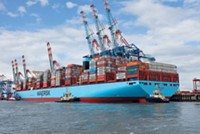Advertisement
Grab your lab coat. Let's get started
Welcome!
Welcome!
Create an account below to get 6 C&EN articles per month, receive newsletters and more - all free.
It seems this is your first time logging in online. Please enter the following information to continue.
As an ACS member you automatically get access to this site. All we need is few more details to create your reading experience.
Not you? Sign in with a different account.
Not you? Sign in with a different account.
ERROR 1
ERROR 1
ERROR 2
ERROR 2
ERROR 2
ERROR 2
ERROR 2
Password and Confirm password must match.
If you have an ACS member number, please enter it here so we can link this account to your membership. (optional)
ERROR 2
ACS values your privacy. By submitting your information, you are gaining access to C&EN and subscribing to our weekly newsletter. We use the information you provide to make your reading experience better, and we will never sell your data to third party members.
Environment
Taking Freight Off The Road
Climate Change: France could cut greenhouse gas emissions by shifting freight transport from trucking to railroads and waterways
by Sara Peach
October 8, 2010

For France, the road to climate protection may require a closer look at planes, trains, barges, and automobiles. In a new analysis, researchers at the Norwegian University of Science and Technology find that France could cut greenhouse gas emissions by shifting freight transportation from roads to rails and inland waterways (Environ. Sci. Tech., DOI: 10.1021/es9025529).
We contribute to climate change when we purchase goods that companies produced and transported using fossil fuels, such as kiwis flown overnight from New Zealand or electronics shipped from China. A 2008 study published in Ecological Economics estimated that nearly a third of the greenhouse gases created by U.S. household consumption are emitted outside the country.
In France, nuclear reactors—which do not emit greenhouse gases—produce 80% of the country's electricity. So cutting emissions in the transportation sector is critical to France’s climate change policy, says Troy Hawkins, one of the Norwegian University of Science and Technology researchers.
Hawkins and his colleague Sébastien Dente developed a new model of the greenhouse gases created by producing and transporting goods for French household consumption. Using 2004 data, they analyzed emissions by type of good, country of origin and mode of transportation. They found that trucking was responsible for 70% of the greenhouse gas emissions associated with freight transport, despite the long distances that many goods traveled by ship.
Next, the researchers calculated the potential benefits of moving 10% of air freight to rail or barge transportation. Surprisingly, they found that reducing air shipments would have little effect on overall greenhouse gas emissions, because they account for only a tiny fraction of the total movement of goods.
But reducing the percentage of imported goods transported by road could cut greenhouse gases significantly, the researchers concluded. Shifting 10% of truck shipments to rail or inland water shipping would reduce emissions by between 3 and 4%.
Deron Lovaas, federal transportation policy director at the Natural Resources Defense Council, an environmental advocacy group, says that because rail and water transport is generally more efficient than trucking, the researchers' findings would likely hold true in other countries. Trains and barges tend to be more efficient than trucks because of their large cargo capacity. Also rails and water generate less friction than roads.
Shifting freight transport away from trucking would also ease congestion, which would save fuel and further reduce greenhouse gas emissions, Lovaas says.
But reworking transportation systems in France or elsewhere will require significant investment in infrastructure, Hawkins says. That means building additional rail lines, improving infrastructure at ports and making sure rivers are navigable. For France, such an undertaking will likely require coordination with other European Union countries.





Join the conversation
Contact the reporter
Submit a Letter to the Editor for publication
Engage with us on Twitter